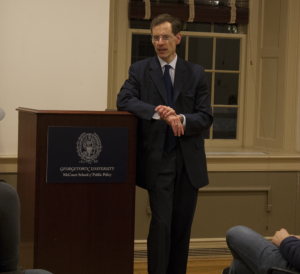Policymakers must ensure their efforts to combat human trafficking prioritize victims of both sex and labor trafficking, School of Foreign Service centennial fellow Ambassador Mark Lagon said at an event in the Old North Building on Monday.
Sex trafficking and labor trafficking are two equally important subcategories within human trafficking; however, large companies may neglect to take measures to address the issue of labor trafficking as comprehensively, Lagon said at an event hosted by Georgetown University College Republicans.
“Moving forward, there will be a rebalancing so that sex traffic is not marginalized, but one also hopes that the labor issue is not de-prioritized because it is found less attractive, or frankly that the business community finds complicated to deal with and its supply chains,” Lagon said.
Lagon, who served as the ambassador-at-large to monitor and combat trafficking in persons under former President George W. Bush, is currently the CEO of the Polaris Group, a Washington, D.C.-based nongovernmental organization focused on the eradication of global slavery.

In 2016, approximately 24.9 million people were victims of forced labor, according to the International Labor Organization. In 2000, the United States passed the Trafficking Victims Protection Act, a comprehensive federal law that seeks to prevent trafficking, protect victims and prosecute perpetrators. Yet tension between prevention of both categories of trafficking still characterizes current efforts to end human trafficking, according to Lagon.
“The emphasis early on was on sex trafficking,” Lagon said. “My predecessor really hammered the issue through and made it a frontline issue, but truth be told, at least a majority of the number of the victims are focused on labor rather than on sex workers.”
Though Lagon spent his time as ambassador-at-large focusing on preventing labor trafficking, the balance between the two sides of human trafficking has shifted during the tenures of different administrations.
“Often there is heavy emphasis on sex trafficking, with many not wanting to go near the issue of labor trafficking per se,” Lagon said. “So as the Trump administration came in, there’s an expectation that there will again be rebalancing of the two issues, and my hope is that there will be a balance between the two issues.”
President Donald Trump and his administration have taken serious measures to combat human trafficking, Lagon said. Trump issued an executive order in December 2017 sanctioning individuals connected to human rights abuses and signed a bill into law in April 2018 making websites liable for any human trafficking that occurs through their platforms.
The American Bar Association has written on the ways that the Trump administration’s immigration policies may actually reduce the protections available for victims of human trafficking.
Victims of human trafficking who are without documentation may not seek legal recourse because of their status, yet victims with documentation warrant just as much protection, according to Lagon.
“There is a certain category of undocumented migrants who isn’t at fault, who were lied to, who was so brutally exploited that they deserve to be treated as a victim of human trafficking and be protected,” Lagon said.
The illegal movement of people is not the most significant aspect of human trafficking despite what the name may suggest, Lagon said.
“It is the exploitation and not the movement that is the distinctive thing, and that is why Republicans and Democrats alike have referred to this as modern slavery,” Lagon said.
The United States pressures countries that face a large number of sex trafficking cases to change their policies using a rating system that gives countries a rating of one to four based on whether they meet the Trafficking Victims Protection Act’s requirements for trafficking prevention, according to Lagon.
The instability and desire for improved quality of life are major factors that put individuals at risk of human trafficking, Lagon said.
“Where there is conflict and chaos, there is a danger of people being exploited,” Lagon said. “Parents will be told that their children will have a better life if they’re moved to a different place.”




















